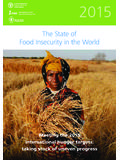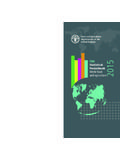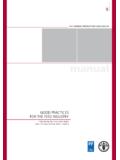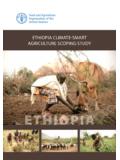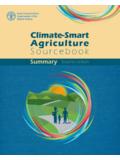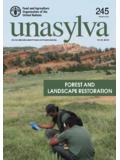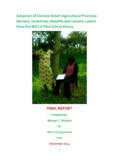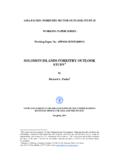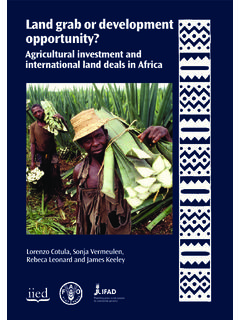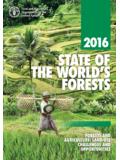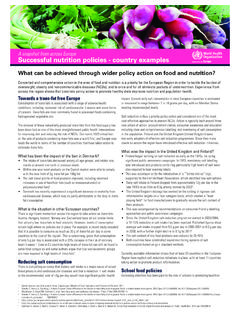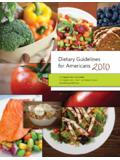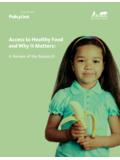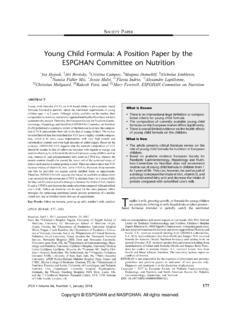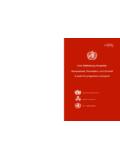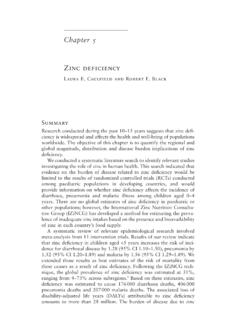Transcription of COMMITTEE ON W F SECURITY - Food and Agriculture ...
1 October 2017 CFS 2017/44/Report This document can be accessed using the Quick Response Code on this page; an FAO initiative to minimize its environmental impact and promote greener communications. Other documents can be consulted at E COMMITTEE ON WORLD food SECURITY "Making a Difference in food SECURITY and Nutrition" Rome, Italy, 9-13 October 2017 REPORT I. ORGANIZATIONAL MATTERS 1. The COMMITTEE on World food SECURITY (CFS) held its Forty-fourth Session from 9 to 13 October 2017 at FAO Headquarters in Rome. The Session was attended by delegates from 116 Members of the COMMITTEE ; 7 non-Member States of the COMMITTEE and by representatives from: 12 United Nations Agencies and Bodies; 112 Civil society organizations1; 3 International agricultural research organizations; 3 International and regional financial institutions; 62 Private sector associations and private philanthropic foundations2; and 58 Observers.
2 2. Four Ministers and two Vice-Ministers registered. The full list of Members, Participants and Observers is available as document CFS 2017/44 ( ) 3. The report contains the following appendices: Appendix A Agenda of the Session; Appendix B Membership of the COMMITTEE ; Appendix C List of Documents. 4. The COMMITTEE was informed that the European Union (EU) was participating in accordance with paragraphs 8 and 9 of Article II of the FAO Constitution. 1 Civil Society s participation was facilitated by the International food SECURITY and Nutrition Civil Society Mechanism (CSM). This figure includes 104 CSOs under the umbrella of the CSM.
3 2 This figure includes 58 companies under the umbrella of the Private Sector Mechanism (PSM). 2 CFS 2017/44/Report 5. The Session was opened by the Chairperson of the COMMITTEE , Amira Daoud Hassan Gornass, Sudan. 6. The COMMITTEE adopted the Provisional Agenda and Timetable. 7. The COMMITTEE appointed a Drafting COMMITTEE composed of Afghanistan, Algeria, Angola, Argentina, Brazil, Canada, China, Equatorial Guinea, Ethiopia, Japan, New Zealand, Norway, Russian Federation, and Sweden, as well as Mr Khaled El-Taweel (Egypt) as Chair of the Drafting COMMITTEE . II. CFS AND THE SUSTAINABLE DEVELOPMENT GOALS (SDGs) 8. Opening statements were delivered by a video message from the United Nations Secretary-General Mr Ant nio Guterres, followed by a statement by Amira Daoud Hassan Gornass, Chairperson of the COMMITTEE on World food SECURITY ; Mr Jos Graziano da Silva, Director General, food and Agriculture Organization (FAO); Mr Gilbert Huongbo, President, International Fund for Agricultural Development (IFAD); Mr David Beasley, Executive Director, World food Programme (WFP).
4 Mr Fabrizio Hochschild, UN Assistant Secretary General for Strategic Coordination and Mr Patrick Caron, Chairperson of the Steering COMMITTEE , High Level Panel of Experts on food SECURITY and Nutrition (HLPE). The statements are available as CFS Information documents at 9. The COMMITTEE considered its engagement in advancing the 2030 Agenda for Sustainable Development to support countries achieve the Sustainable Developments Goals (SDGs). The session opened with a keynote address by John Agyekum Kufuor, followed by a presentation by FAO of the new report on the State of food SECURITY and Nutrition in the World 2017 and a presentation by Ahmed Bin Ahmed Al-Maisary, Minister for Agriculture and Irrigation, Yemen.
5 These led to a discussion of the state of food SECURITY and nutrition in the world and on recent trends. 10. A session on lessons learned in implementing the 2030 Agenda for Sustainable Development focused on countries perspectives and experiences in putting in place government policies as well as private sector and civil society efforts to achieve the SDGs. The COMMITTEE reflected on its efforts to support global follow-up and review through its contributions to the United Nations High-level Political Forum on Sustainable Development (HLPF). 11. For agenda item The State of food SECURITY and Nutrition in the World 2017 , the COMMITTEE : a) Welcomed the collaboration between FAO, IFAD, UNICEF, WFP and WHO around the new State of food SECURITY and Nutrition in the World Report, and took note of its contribution to monitoring the food SECURITY and nutrition targets of the 2030 Agenda for Sustainable Development.
6 B) Expressed concern that, for the first time since 2003, the number of chronically undernourished people in the world has increased, up to 815 million from 777 million in 2015, which, together with rising rates of overweight and obesity, means the world is not on track to achieve SDG 2 and other targets of the 2030 Agenda related to food SECURITY and nutrition; c) Recognised that conflict, climate change and protracted crises are some of the main causes of the recent increase in food insecurity, drivers of situations of severe food crisis; and, in particular, that hunger and undernutrition are significantly worse where conflicts are prolonged, and institutional capacities are weak; d) Called on all stakeholders, including governments and the UN system, to accelerate efforts to address the root causes of such devastation and terrible suffering, with famine declared in South Sudan in 2017 and threatening in North-Eastern Nigeria, Somalia, and Yemen; CFS 2017/44/Report 3 e) Recognised that international action should address immediate needs and contribute to the recovery, sustainability and resilience of societies, including building and strengthening sustainable food systems.
7 And f) Encouraged governments and all national and international stakeholders, in the framework of national and international laws, to use and apply CFS policy products, and in particular the CFS Framework for Action for food SECURITY and Nutrition in Protracted Crises (CFS-FFA). 12. For agenda item Lessons learned implementing the 2030 Agenda , the COMMITTEE : a) Welcomed the lessons presented by volunteer countries on their national experiences in achieving the SDGs related to food SECURITY , nutrition and sustainable Agriculture , and examples of successful country initiatives, as well as challenges encountered. In particular: i) Commended the leadership that countries are showing in the implementation of the 2030 Agenda for Sustainable Development, and the readiness of Azerbaijan, Belgium, Ethiopia, Indonesia, Italy and Sweden, among the 43 Voluntary National Review countries in 2017, to discuss their experiences at CFS; ii) Welcomed the steps taken by countries to reform their policies, aiming to improve the overall sustainability of their food systems and their ability to ensure national food SECURITY and nutrition through holistic approaches.
8 Iii) Recognised the diversity of approaches to promote inclusive implementation and ownership of the SDGs within societies, including consultations, communication and outreach efforts, and establishment of inclusive institutions to oversee the implementation and review of policies from national to local levels; iv) Noted that important challenges remain, such as: addressing simultaneously all forms of malnutrition; supporting small-scale food producers to overcome poverty and adopt more productive and sustainable practices; improving the overall economic, social and environmental sustainability of the food systems; and addressing regional and/or rural-urban inequalities and the lack of rural infrastructure.
9 V) Acknowledged the lessons shared by the volunteer reporting countries on the importance of political leadership at all levels, support for multistakeholder processes and effective partnerships, the importance of disaggregated data and monitoring, and the need for capacity development; and vi) Renewed its call to all countries to apply policy frameworks such as the CFS products to achieve the SDGs. 13. For agenda item CFS and the 2030 Agenda: Reflections from HLPF 2017 and contributions to HLPF 2018, the COMMITTEE : a) Expressed its appreciation for the work of the Open Ended Working Group (OEWG) on SDGs, presented by Mr Willem Olthof (EU), Chair of the OEWG on SDGs.
10 B) Noted the 2017 UN High-level Political Forum on Sustainable Development (HLPF) Ministerial Declaration which reiterates the crucial role that sustainable food systems can play in eradicating poverty and hunger, and which makes reference to key messages promoted by CFS and the Rome-based Agencies (RBAs), inter alia, on tenure governance, responsible investment, sustaining rural and urban livelihoods, climate change adaptation and mitigation measures, biodiversity, women s empowerment and gender equality, addressing the special needs of the most vulnerable countries and communities requiring 4 CFS 2017/44/Report urgent humanitarian assistance, and raising the productivity of small-scale producers, in particular women, indigenous peoples, family farmers, pastoralists and fishers.
